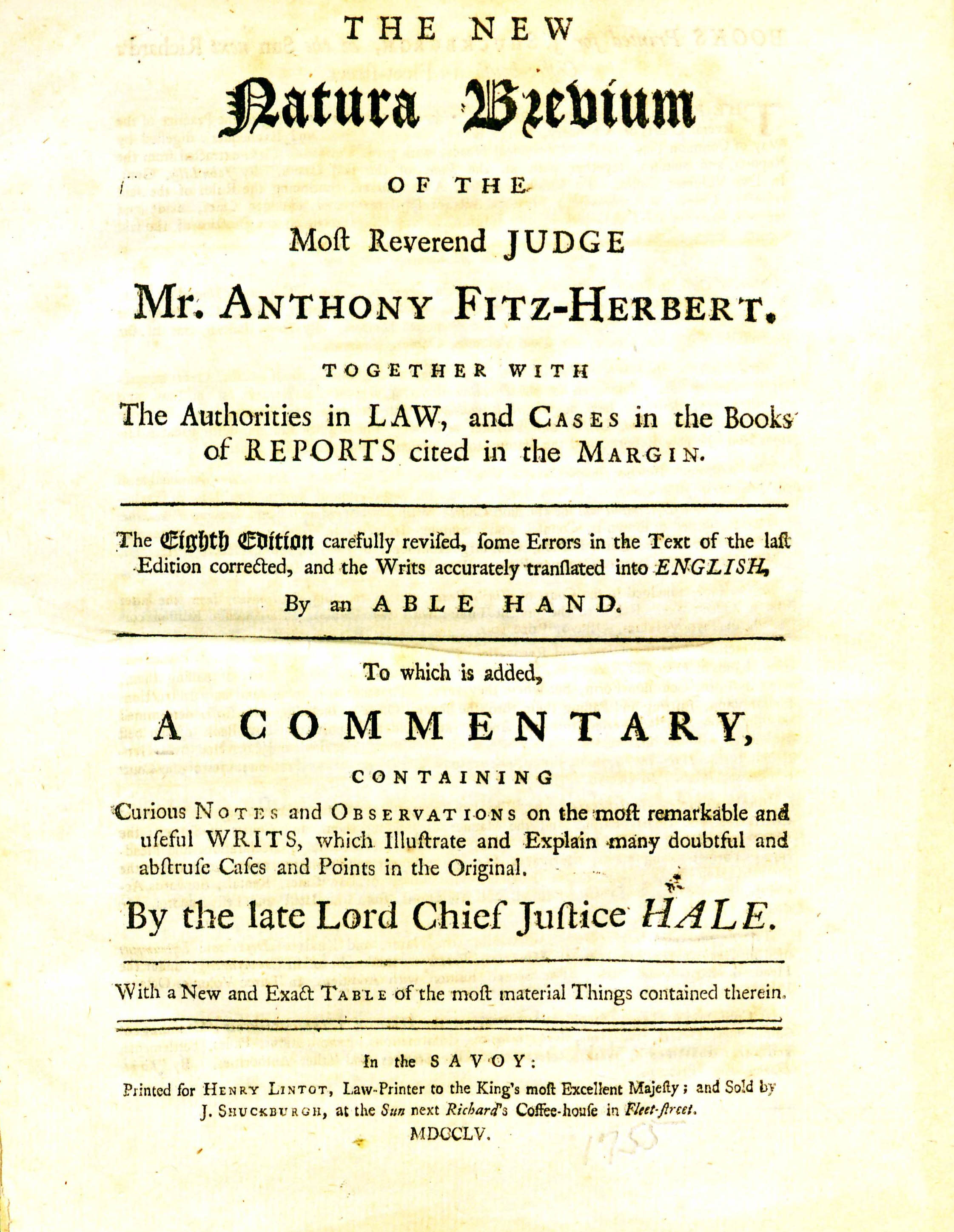Difference between revisions of "New Natura Brevium"
| Line 5: | Line 5: | ||
|imagename=FitzherbertNewNaturaBrevium1755TitlePage.jpg | |imagename=FitzherbertNewNaturaBrevium1755TitlePage.jpg | ||
|link=https://catalog.swem.wm.edu/law/Record/529996 | |link=https://catalog.swem.wm.edu/law/Record/529996 | ||
| − | |shorttitle= | + | |shorttitle=The New Natura Brevium |
|author=Sir Anthony Fitzherbert | |author=Sir Anthony Fitzherbert | ||
|edition=Eighth, carefully revised | |edition=Eighth, carefully revised | ||
Revision as of 15:17, 9 January 2014
by Anthony Fitzherbert
| The New Natura Brevium | |
|
Title page from The New Natura Brevium, George Wythe Collection, Wolf Law Library, College of William & Mary. | |
| Author | Sir Anthony Fitzherbert |
| Published | London (In the Savoy): Printed for Henry Lintot and sold by J. Shuckburgh |
| Date | 1755 |
| Edition | Eighth, carefully revised |
| Language | English |
| Pages | [12], 606, [42] |
The New Natura Brevium was a highly influential treatise on English law first issued in French in 1534 and written by Sir Anthony Fitzherbert (1470-1538), an English judge, scholar, and "one of the best-known English legal writers of the sixteenth century."[1] Frequently cited in judgments for more than two hundred years following its publication,[2] The New Natura Brevium is an important article on 16th century common law.
Fitzherbert had already published Magnum Abbreviamentum, an abridgment of the year books,[3] "a massive digest of 13,845 cases ... arranged under alphabetical headings.[4] In 1522, he was made a judge of common pleas and was knighted, although he continued to write and soon after published three works: one on law, one on agriculture, and one of law and agriculture combined.[5]
However, it is for The New Natura Brevium that Fitzherbert remains most well-known. In it he touches on an array of legal issues ranging from the skill and care one is owed by an expert, the cause of action for a victim of fraud, and the scope of liability for trespasses on land.[6] His analysis was crucial to the development of English common law,[7] and consequently the foundation of the United States’ legal system.
Evidence for Inclusion in Wythe's Library
Both Dean's Memo[8] and the Brown Bibliography[9] suggest Wythe owned this title based on notes in John Marshall's commonplace book.[10]
Description of the Wolf Law Library's copy
Rebound in brown buckram; pencil annotations on flyleaf.
View this book in William & Mary's online catalog.
References
- ↑ J. H. Baker, "Fitzherbert, Sir Anthony (c.1470–1538)", Oxford Dictionary of National Biography, Oxford University Press, 2004; online edn, Jan 2008, accessed 18 Sept 2013.
- ↑ William Douthwaite, Gray’s Inn (London: Reeves and Turner, 1886), 46.
- ↑ Encyclopedia Britannica, s.v. "Fitzherbert, Sir Anthony."
- ↑ Baker, "Fitzherbert, Sir Anthony."
- ↑ Ibid."
- ↑ Douthwaite, Gray’s Inn.
- ↑ Ibid."
- ↑ Memorandum from Barbara C. Dean, Colonial Williamsburg Found., to Mrs. Stiverson, Colonial Williamsburg Found. (June 16, 1975), 11 (on file at Wolf Law Library, College of William & Mary).
- ↑ Bennie Brown, "The Library of George Wythe of Williamsburg and Richmond," (unpublished manuscript, May, 2012) Microsoft Word file. Earlier edition available at: https://digitalarchive.wm.edu/handle/10288/13433
- ↑ The Papers of John Marshall, eds. Herbert A. Johnson, Charles T. Cullen, and Nancy G. Harris (Chapel Hill: The University of North Carolina Press, in association with the Institute of Early American History and Culture, 1974), 1:46.
